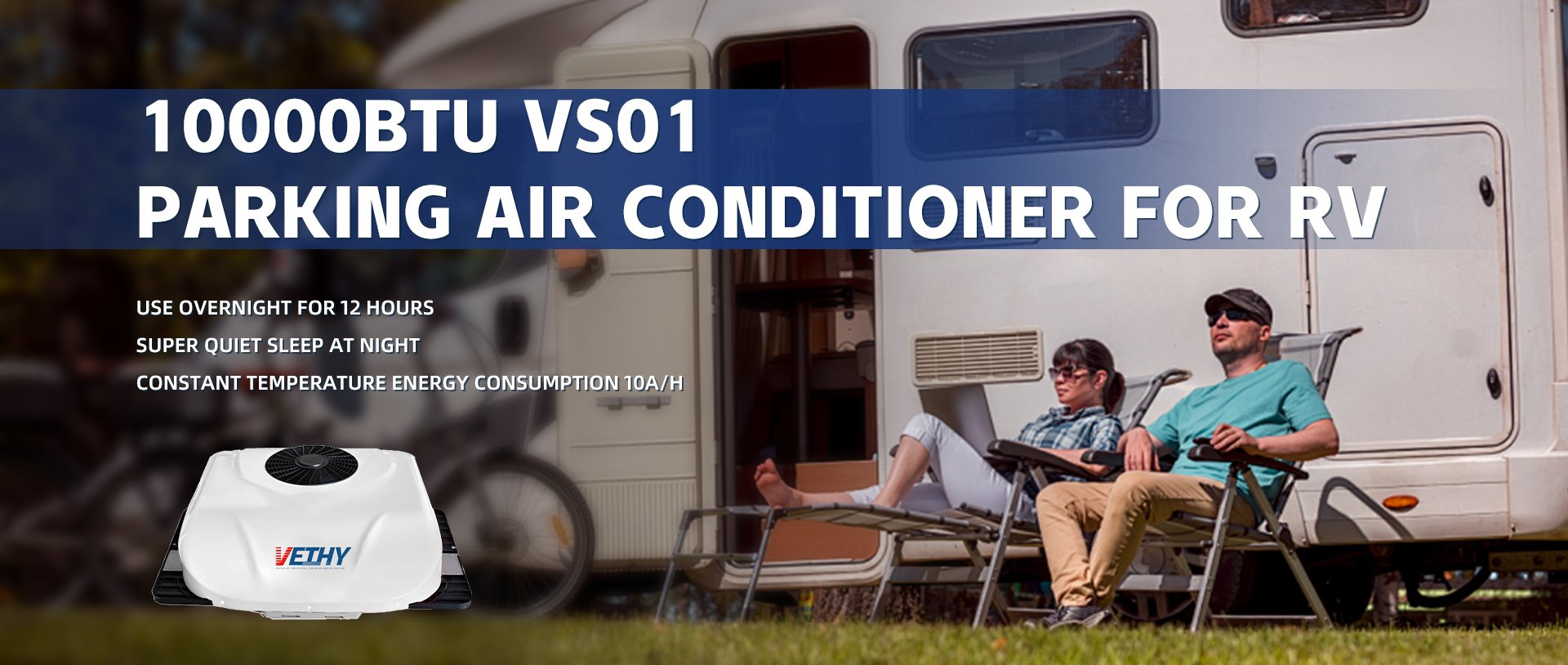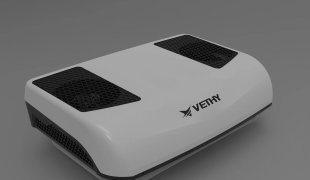Main Types of Parking Air Conditioners
November 25, 2024
Main Types of Parking Air Conditioners
Parking AC Introduction
In the transportation industry, providing a secure and comfortable working environment for drivers like vethy is essential. Car cooling systems known as parking air conditioners, or PACs for short, are essential components that allow drivers to take breaks without starting their engines while their automobiles are parked. This increases safety and operating efficiency and enhances comfort at the same time. The significance of parked air conditioners, the range of models available, and their applications in different industries will all be covered in this article.
Defining Parking Air Conditioners
Specialized cooling systems called parking air conditioners are made to keep cars at a suitable temperature when they are not moving. These devices use battery power to cool the interior area while operating independently of the vehicle's engine. This function is very helpful for long-distance drivers who need to take comfortable pauses and relax.
Related product company: Vethy

As a specialist in parking air conditioners at Vethy Industries, I'm thrilled to continue the conversation about our commitment to providing innovative cooling solutions for vehicles. Our parking air conditioners are designed to offer a comfortable respite for drivers during those necessary breaks on long journeys, ensuring that the cabin remains at an optimal temperature without the need for the vehicle's engine to be running
Vethy Industries has a legacy of innovation, with our VS01, VS02, and VS02 Pro models at the forefront of our parking air conditioner lineup. Each model is crafted with the end-user in mind, providing not only cooling capabilities but also energy efficiency and ease of use. Our VS01 is an excellent entry-point for those seeking reliable and straightforward cooling solutions. VS02 builds on this by modifying refrigerant technology and compressor technology to improve performance, while VS02 Pro uses the latest technology and an exclusive patented appearance to meet the needs of the most demanding users.。
Our investment in R&D has resulted in nearly 100 patents, demonstrating our ambition to lead the industry. We have made great progress over the past few years, reducing power consumption by at least 20% and increasing cooling capacity by 25%, up to a maximum cooling capacity of 2900W, thanks to the latest technology of R410A refrigerant system and twin-rotor compressor.
At Vethy Industries, we value the complete experience in addition to the product. For this reason, we offer complete support, including installation advice and technical help. Additionally, we have left our imprint on the international scene, serving over 8,000 corporate clients and having our products purchased in 210 countries. Through ten years of involvement in trade events such as Automechanika and Canton Fair, we have established connections with international investors and obtained approximately $100 million in planned collaboration.。
Looking ahead, we are excited about the growth of electric vehicles and how our parking air conditioners will enhance the driving experience for every passenger, driver, and passenger. Vethy Industries’ focus on innovation and sustainability puts it in a strong position to lead the automotive cooling systems market for many years to come.
Significance for Comfort and Safety
One of the main ways that parking air conditioners improve driving is by offering the following:
Comfort: Extended driving periods can result in exhaustion, and a cozy cabin is crucial for the welfare of drivers.
Safety: A cool, comfortable environment helps keep people awake and lowers the chance of heat-related fatigue-related mishaps.
Vehicle Protection: PACs assist shield delicate materials and equipment from heat-related damage by limiting excessive temperatures within the car.
Preview of Key Types and Applications
This page will cover a variety of parked cooling system types, like as split units, rooftop units, portable units, and integrated systems. We will also examine their benefits, characteristics, and applications in a range of contexts, such as emergency services, fleet management, recreational vehicles (RVs), public transit, and maritime applications. The Value of Comfortable Parking Air Conditioners for Long-Haul Vehicles
The Importance of Parking Air Conditioners
Comfort for Long-Haul Drivers
Long-distance drivers often spend a lot of time in their vehicles. The much-needed relief from extreme heat that parking air conditioners offer allows drivers to sleep soundly during breaks. This comfort is essential for maintaining focus while driving as well as for one's own well-being.
Impact on Driver Health and Productivity
Heat can have a serious effect on a driver's health. High temperatures have been linked to fatigue, dehydration, and diminished mental function. By keeping the environment cool, parking air conditioners increase driver productivity and provide better health outcomes.
Reducing Vehicle Heat-Related Damage
Vehicle electronics and interiors can sustain damage from extreme heat. By keeping the cabin at a constant temperature and extending the life of important car systems, parking air conditioners reduce this danger.
Main Types of Parking Air Conditioners
Rooftop Units
Description and Operation
Portable parking air conditioners are independent units that are transportable from one car to another. Usually, they are powered by batteries or conventional electrical outlets.Positives and Negatives
.Advantages and Disadvantages
· Advantages: Efficient cooling capacity; space-saving design.
· Disadvantages: Can be complex to install; may require structural modifications.
Best Use Cases
Ideal for large vehicles such as trucks or buses where interior space is limited.
Split Units
Description and Operation
Split units consist of two main components: an indoor evaporator unit and an outdoor condenser unit. This design allows for quieter operation inside the vehicle while maintaining effective cooling performance.Advantages and Disadvantages
· Advantages: Quieter operation; flexible installation options.
· Disadvantages: Higher initial costs; requires more installation space.
Best Use Cases
Suitable for emergency service vehicles where noise reduction is critical.
Portable Units
Description and Operation
Portable parking air conditioners are standalone systems that can be moved between vehicles. They typically run on battery power or standard electrical outlets.Advantages and Disadvantages
· Advantages: Versatile; easy to install and relocate.
· Disadvantages: Limited cooling capacity; may require frequent recharging.
Best Use Cases
Perfect for recreational vehicles (RVs) or temporary installations where flexibility is needed.
Integrated Units
Description and Operation
Integrated units combine both heating and cooling functions within a single system. They are designed to operate efficiently regardless of external temperature conditions.Advantages and Disadvantages
· Advantages: Dual functionality; efficient use of space.
· Disadvantages: Higher initial cost; potential complexity in maintenance.
Best Use Cases
Best suited for regions with extreme temperature fluctuations where both heating and cooling are necessary.
Features and Specifications to Consider
Cooling Capacity and Efficiency
Think about a parked air conditioner's cooling capability, expressed in British Thermal Units (BTUs), when making your choice. Better performance in larger spaces is indicated by higher BTU ratings.
Energy Consumption and Fuel Impact
Energy-efficient models reduce fuel consumption significantly when compared to traditional idling methods. Look for units with low energy usage ratings to minimize operational costs while maximizing comfort.
Noise Levels and Operational Quietness
Noise levels vary among different types of PACs. For environments where quiet operation is essential—such as sleeper cabs or emergency service vehicles—selecting a quieter model is advisable to avoid disrupting rest periods.
Ease of Installation and Compatibility
Consider how easily the unit can be installed in your specific vehicle type. Some models may require professional installation due to complexity or specific compatibility requirements with existing systems.
Battery Drain and Management Systems
Evaluate how much power the unit consumes from the vehicle’s battery. Efficient battery management systems help prevent battery drain during extended use without running the engine.
Applications Across Industries
Fleet Management and Logistics
In fleet management, parking air conditioners are vital for ensuring that drivers remain comfortable during long hauls while also protecting cargo from heat damage. This application is crucial in maintaining operational efficiency across logistics networks.
Public Transportation Systems
In public transport vehicles such as buses or shuttles, PACs enhance passenger comfort during stops—especially in extreme weather conditions—ensuring a pleasant travel experience that encourages ridership.
Emergency and Service Vehicles
Keeping the surroundings cool is crucial for the safety of the workers and the efficiency of operations during lengthy delays at scenes for emergency responders who may need to stay in their cars for extended periods of time while reacting to events.
Recreational Vehicles (RVs)
RVs benefit significantly from parking air conditioners by allowing users to enjoy comfortable camping experiences without needing to run the engine continuously. This feature enhances leisure activities while promoting energy efficiency.
Marine and Boating Applications
In marine environments, PACs help maintain comfortable temperatures in cabins while docked or anchored. This capability enhances overall user experience on watercraft by providing a pleasant atmosphere regardless of external conditions.
Choosing the Right Parking Air Conditioner
Assessing Your Vehicle's Needs
Assessing Your Vehicle's Needs In order to choose the right PAC type for you, take into account various aspects such the kind of car you drive, how big it is, how often you use it, and the local temperature. Making selections that align with your operating demands will be made easier if you have a thorough awareness of these elements.
Climate and Weather Considerations
The local climate should be taken into account while choosing a unit. Higher capacity units can be required in hotter or more humid places to provide sufficient cooling performance across variable weather patterns.
Budget and Cost-Effectiveness
Analyze both initial costs as well as long-term savings when choosing a PAC. While energy-efficient models may have higher upfront costs due to advanced technology features, they often save money over time through reduced fuel consumption during operation.
Maintenance and Service Availability
Select a model that offers easy maintenance options with readily available parts or service support networks. Ensuring that you have access to maintenance services will extend the lifespan of your PAC while keeping it functioning optimally throughout its use.
Advanced Technologies in Parking Air Conditioners
Smart Controls and Automation
Modern PACs often feature smart controls that allow users to set temperature preferences remotely or program cooling cycles based on usage patterns—enhancing convenience while optimizing energy consumption based on real-time needs.
Energy-Saving Inverter Technology
Instead of constantly cycling on and off, inverter technology adjusts compressor speed based on cooling demand, improving energy efficiency. This technique lowers component wear over time in addition to saving energy.
Eco-Friendly Designs and Refrigerants
Many of the more recent versions use environmentally friendly refrigerants that reduce their impact on the environment while maintaining good cooling performance; these models are in line with current global sustainability initiatives across a range of industries. Upkeep and Extended Life of Parking Air Conditioners
Maintenance and Longevity of Parking Air Conditioners
Routine Maintenance Checks
Maintaining your PAC system at its best over time requires routine maintenance inspections. This entails routinely cleaning filters, monitoring refrigerant levels, carefully examining electrical connections, and taking immediate action to resolve any concerns before they develop into more serious ones later on!
Common Issues and Repair Solutions
Be aware of common issues such as refrigerant leaks or compressor failures that may arise during operation—addressing these problems promptly can significantly extend the life of your PAC system while minimizing downtime associated with repairs!
Extending the Life of Your Parking Air Conditioner
Implementing best practices such as avoiding excessive idling or using energy-efficient settings can prolong the lifespan of your unit significantly—ensuring reliable performance throughout its use!
Case Studies and User Experiences
Success Stories from Satisfied Customers
Many fleet operators report significant savings on fuel costs after installing parking air conditioners in their vehicles due largely due reduced engine idling time—enhancing overall operational efficiency across logistics networks!
Challenges Overcome in Harsh Climates
Users operating within extreme climates have shared how PACs have allowed them maintain safe working conditions despite high external temperatures—providing peace-of-mind knowing they’re equipped with reliable solutions!
ROI And Cost-Benefit Analysis From Business Owners
Business owners often find that initial investments into parking air conditioning systems pay off quickly through fuel savings alongside improved driver satisfaction rates—ultimately leading towards enhanced productivity levels across operations!
Future Trends And Developments
Upcoming Innovations In Parking Air Conditioning
The industry is seeing advancements in technology including enhanced energy efficiency ratings along with improved smart controls—driving further demand towards innovative solutions tailored specifically towards user needs!
Anticipated Changes In Industry Standards
As environmental concerns continue growing globally—we expect stricter regulations regarding emissions from idling engines which will further drive demand towards parking air conditioning systems across various sectors!
Environmental Impact And Sustainability Efforts
Manufacturers are creating more environmentally friendly goods that use less energy while keeping performance standards as a result of the growing emphasis on sustainability. These efforts are in line with larger initiatives to lower carbon footprints across industries!
Frequently Asked Questions (FAQs)
1. What Is A Parking Air Conditioner?
A parking air conditioner refers specifically designed equipment used primarily within trucks/vans/cars/RVs etc., allowing users adjust/control temperature/humidity flow rate etc., independently without needing run engine!
2. How Does It Save Fuel?
By eliminating need idle engine during breaks/rest periods—PACs significantly reduce overall fuel consumption compared traditional methods!
3. Can I Install One Myself?
While some models allow DIY installation—it’s recommended seek professional assistance ensure proper function & avoid potential complications arising improper setup!
4. What Maintenance Do They Require?
Regular filter cleaning/checks refrigerant levels/inspections electrical components essential maintaining optimal performance over time!
5. Are There Portable Options Available?
Yes! Portable parking air conditioners offer versatility but typically lower cooling capacities compared fixed units!
Conclusion
Selecting an appropriate parking air conditioner remains vital ensuring comfort/safety/efficiency vehicle operations! By considering various factors including type/capacity/energy efficiency/maintenance needs/specific use cases across industries—we can make informed decisions enhancing overall driving experience!
Call To Action
Explore our detailed guides focused specifically upon individual types parking air conditioners tailored directly towards your unique needs! For personalized advice/quotes suited specifically towards fleet requirements—please contact our experts today!





